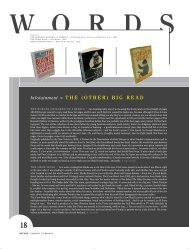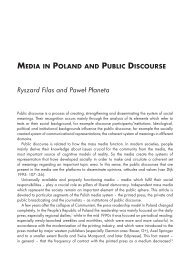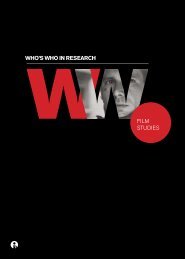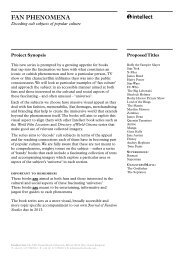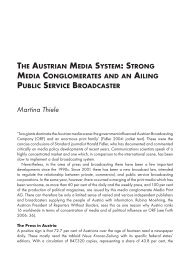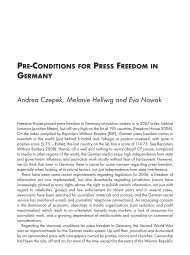Anthem - Intellect
Anthem - Intellect
Anthem - Intellect
You also want an ePaper? Increase the reach of your titles
YUMPU automatically turns print PDFs into web optimized ePapers that Google loves.
<strong>Anthem</strong><br />
their opposition to Turkish membership. The ‘no’ can be grounded in<br />
rightist-populist terms (no to the Turkish threat to our culture, no to<br />
the Turkish cheap immigrant labor), or in the liberal-multiculturalist<br />
terms (Turkey should not be allowed in because, in its treatment of<br />
the Kurds, it doesn’t display enough respect for human rights). But the<br />
opposite view, the ‘yes’, is as false as Beethoven’s final cadenza. […]<br />
So, should Turkey be allowed into the Union or should it be let to<br />
‘steal itself weeping away’ from the EU’s circle? Can Europe survive<br />
the Turkish march? And, as in the finale of Beethoven’s Ninth, what<br />
if the true problem is not Turkey, but the basic melody itself, the song<br />
of European unity as it is played to us from the Brussels post-political<br />
technocratic elite? What we need is a totally new main melody, a new<br />
definition of Europe itself. The problem of Turkey, the perplexity of<br />
European Union with regard to what to do with Turkey, is not about<br />
Turkey as such, but the confusion about what is Europe itself. The<br />
impasse with the European Constitution is a sign that the European<br />
project is now in search of its identity. 394<br />
Žižek uses what he hears in Beethoven to reinforce his critical opinions on the EU<br />
project. His specific reading seems to contradict the ‘empty signifier’ thesis he borrowed<br />
from Cook, but may also be regarded as an example of Cook’s request for continued<br />
reinterpretation to prevent the music from being appropriated by ideology.<br />
Interpreting the European anthem<br />
This whole argument is based on the larger symphony context of the ‘Ode’, but its<br />
relevance to the European anthem is questionable, as the latter silences all the lyrics as<br />
well as the Turkish sounds. The European anthem is thus at a significant distance from<br />
the text that Žižek and Cook analyse. It is possible that the Beethoven context remains<br />
an absent but still somehow remembered intertext, but one must also consider what<br />
the anthem expresses as such, in order to see how relevant these echoes from its<br />
original setting may still be.<br />
It should first be noted that the uses made of the ‘Ode’ melody are not equally<br />
divorced from the original symphony context. Beethoven’s Ninth Symphony is the<br />
most significant context in which the ‘Ode to Joy’ melody is embedded, and from<br />
which any interpretation of the European anthem necessarily fetches at least some<br />
elements. But to what extent is it its location in this context that has enabled it to have<br />
so many different uses, or is it on the contrary its isolation from this context that has<br />
opened up such an interpretive span? This is not easy to assess. The expressive force<br />
171




